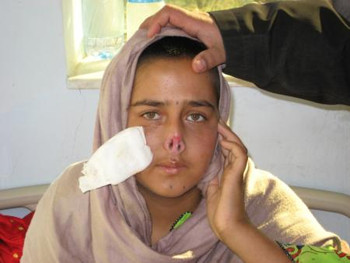By Noor Wali Sayeed Shinwarai
Women's and rights organisations including the Afghanistan Independent Human Rights Commission (AIHRC), and the Ministry of Women's Affairs are reporting that the situation is grim for women across the country. Latifa Sultani, women's rights programme coordinator at the AIHRC, says the situation was bad in insecure provinces but now even the relatively quieter provinces like Kabul, Bamyan, Badghis, Jozjan, Samangan and Takhar are reporting abuse and worse. Last year (between March 21, 2014 and March 21, 2015), AIHRC reported 92 cases of so-called honour killings. The Ministry of Women's Affairs says six cases were reported in the first two months of this year. The ministry's Aziza Adalatkhwah says two of the murders were in Badakhshan, one in Nimroz, two in Herat and one in Ghazni. "Following our investigations, we feel all were victims of domestic violence and were killed," she told Killid in an interview.
Kabul
The Criminal Investigation Department in Kabul has recorded eight deaths of women; three suicides and two murders. General Farid Fazli, the head of criminal investigations at Kabul Police headquarters told Mursal weekly that the graph of violence against women is not limited to just these; there are many more cases of abuse, violence and illegal relations that have put Kabul in the list of most violent provinces from the viewpoint of women. "Most of the murders of women have been done by family members, and we have made arrests, and handed them over to the justice departments," General Fazli says.
Women have been found battered to death in public places or in the ruins of buildings in Kabul. Zainab Akhlaqi who lives in Dasht e Barchi, says she saw the body of a girl, who had been raped and killed in the 13th District. "A 20-year-old girl studying in a private university was abducted when she was returning home at 8 at night, sexually attacked and killed. The family did not want to be disgraced and no judicial department asked about her," the young woman says. She herself has been told by her family to leave her studies lest she too becomes a victim.
Robina Hamdard, head of Afghan Women's Network, knows of a case in Deh Sabz district, Kabul province, where a man killed his wife, and his son who was a witness to the crime. "The man then informed the security forces that his family members were killed by ISIS. But investigation by the police revealed otherwise," she says.
Western zone
Honour killings have spiralled this year in the western zone, according to AIHRC. Abdul Qader Rahimi, the head, reports that they have already recorded some 10 cases this year. He says there is concern because the numbers are much higher compared to the same period last year, and the graph may be even higher in the future. "If we compare the figures, while the figure was 30 cases (of honour killings) in the whole of last year, there are 10 cases in just the first three months. I fear that this year may be more tough and bitter for women in Herat," says Rahimi.
The concern has been heightened by evidence of a 90 percent increase in suicide among women, reported by the Herat government hospital. Mohammad Rafiq Sherzad, the spokesperson, says there were 60 cases of attempted suicide in the hospital. Seven of the patients could not be saved.
"Suicide attempts have increased 90 percent this year," says Samia Taheri, head of the rights department in the Herat Women's Affairs Department. An alarming 100 cases of violence against women have been recorded so far this year in Herat, making it one of the most difficult provinces for women's rights.
Abdul Rawoof Ahmadi, spokesperson for Herat Police, says they are trying very hard to investigate all cases of honour killings, sexual abuse and violence against women, and hand over culprits to the law. "We have made some 10-12 arrests in cases of suicide to prove that women were forced to take their lives," he says. "We are trying to prevent violence against women."
North

Afghan woman whose nose was cut by her husband.
AIHRC in the north sees a correlation between rising insecurity and violence against women. Fawzia Nawabi, head of the commission's women's department for the north, says they have recorded 34 cases this year. "This year some 10 cases happened in Balkh and the rest in Sar-e Pol, Jozjan and Samangan provinces." The cases include women who have fled abusive marriages and those given as baad.
South-east
AIHRC staff in the south-east zone told Killid reporter Esmail Larwai that cases of violence against women have doubled over the past year. The commission has produced a comprehensive report on the situation in Paktia, Paktika and Khost provinces that records 346 cases this year, including threats of violence, torture and murder.
Zarmina Shams, in-charge of the women's department for the south-east at AIHRC, says violence levels are "high". "Beatings, murder and consuming poison or overdosing with medicines keep the level of violence high," she says.
Noor Ahmad Shahim, head of the regional office of AIHRC in Gardez thinks reporting of violence against women cases has improved. "Many more people are coming to the commission," he says.



